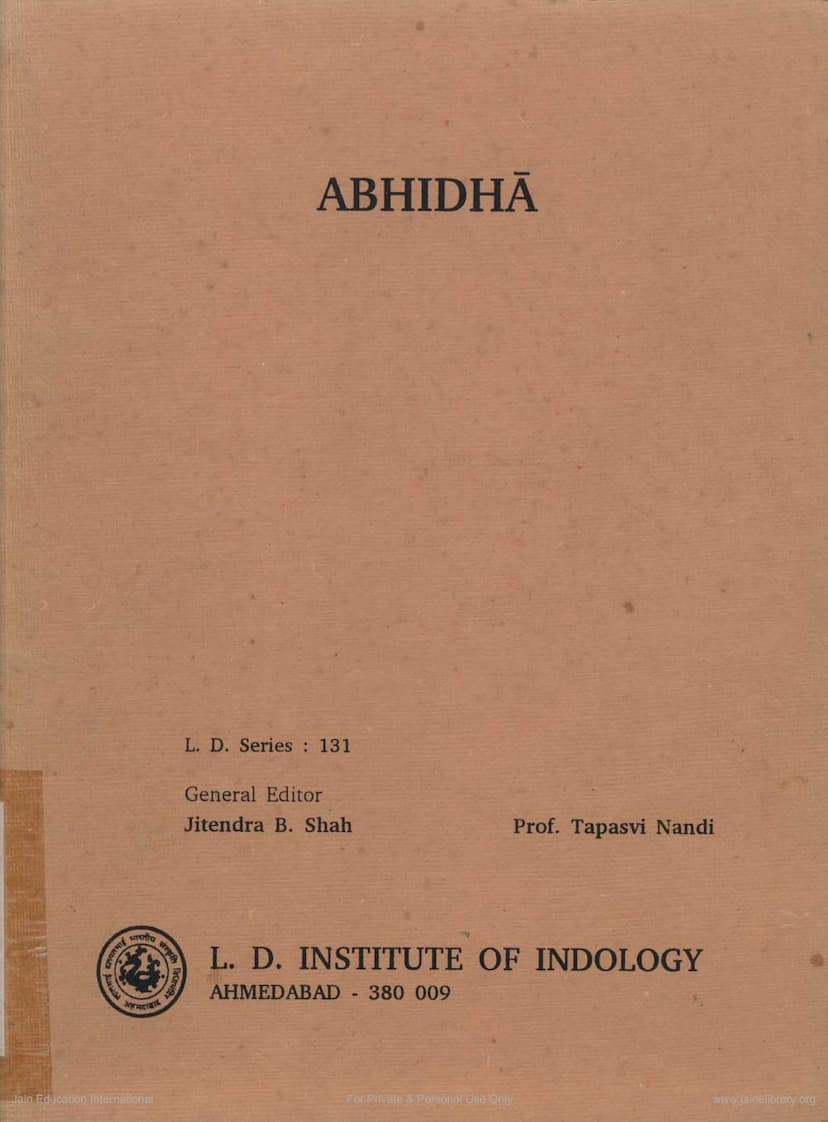Abhidha
Added to library: September 1, 2025

Summary
Here's a comprehensive summary of the Jain text "Abhidhā" based on the provided pages:
Book Title: Abhidhā Author: Prof. Tapasvi Nandi Publisher: L. D. Institute of Indology, Ahmedabad Series: L. D. Series: 131 First Edition: February 2002 ISBN: 81-85857-13-X Price: Rs. 120
Core Subject: The book "Abhidhā" delves into the concept of "Abhidhā" (meaning-giving power of a word) within the context of Indian literary criticism and poetics (Alamkāraśāstra). It critically examines various philosophical and linguistic schools of thought on this topic, with a particular focus on contrasting the "Kashmir School" of literary aesthetics with other traditions, such as the "Mālava School."
Key Figures and Their Ideas Discussed:
The book explores the evolution and differing interpretations of "Abhidhā" through the views of prominent scholars:
- Anandavardhana: Founder of the Kashmir School, who distinguished "Abhidhā" from "Vyañjanā" (suggestion) and established "Vyañjanā" as a distinct power of the word.
- Abhinavagupta: A key proponent and expander of Anandavardhana's theories.
- Mammata: Another influential figure of the Kashmir School, whose "Kāvyaprakāśa" is considered a foundational text. Mammata clearly defined "Abhidhā," "Lakṣaṇā" (indication/metaphor), and "Vyañjanā" as distinct "Śabda-vrttis" (powers of a word).
- Mukula Bhatta: Author of "Abhidhā-vrtta-mātrkā." Mukula accepted only two "Śabda-vrttis": "Abhidhā" and "Lakṣaṇā." He considered "Lakṣaṇā" an extension of "Abhidhā" and broad enough to include "Vyañjanā." His work influenced later thinkers like Bhoja and Mammata.
- Kuntaka: Known for his concept of "Vakrokti" (artful speech). Kuntaka believed there was only one power of poetic word, which he termed "Abhidhā" but with a broader connotation than the Kashmir School. This "Vicitrā Abhidhā" (beautiful or artful expression) encompassed "Lakṣaṇā" and "Vyañjanā," provided they possessed artistic merit. He proposed a less systematic but poetically focused approach.
- Mahimā Bhatta: Author of "Vyaktiviveka." Mahimā radically defied the Kashmir School's scheme. He rejected "Lakṣaṇā" and "Vyañjanā" as distinct "Śabda-vrttis," arguing that all meaning beyond the literal ("vācya") is arrived at through "Anumiti" (inference), or "Kāvyānumiti" (poetic inference). He believed words had only one power: "Abhidhā."
- Bhoja: Represents the "Mālava tradition." Bhoja's approach was broader, incorporating both poetic and non-poetic literature. He classified "Abhidhā" into three types: "Mukhya" (principal, equivalent to the Kashmir School's "Abhidhā"), "Gaunī" (secondary, often based on similarity or connection), and "Lakṣaṇā" (indication). He saw "Gaunī" and "Lakṣaṇā" as extensions of his broader "Abhidhā," influenced by earlier thinkers like Mukula. His work, particularly "Śrngāra-Prakāśa," outlines a twelve-fold "Sahitya" (relation between word and meaning), with "Abhidhā" being the first.
- Hemacandra: Author of "Kāvyānuśāsana." Hemacandra revived the tradition of treating "Gaunī" and "Lakṣaṇā" as independent "Śabda-vrttis," separate from each other and distinct from "Abhidhā." He offered a clear and lucid classification, influenced by both Mukula and Mammata. His "Gaunī" is superimposed through difference or identity, often based on "nimitta" (cause) or "prayojana" (motive). His "Lakṣaṇā" involves superimposition at the meaning level through identity.
Key Debates and Contrasts:
The book highlights the ongoing intellectual debates surrounding "Abhidhā":
- The Kashmir School vs. Others: A central theme is the contrast between the systematic, tripartite division of "Śabda-vrttis" (Abhidhā, Lakṣaṇā, Vyañjanā) advocated by the Kashmir School (Anandavardhana, Abhinavagupta, Mammata) and the more inclusive or radically reductive approaches of others.
- The Nature of "Lakṣaṇā": Different scholars debated whether "Lakṣaṇā" was an extension of "Abhidhā" (Mukula, Bhoja) or a distinct power.
- The Rejection of "Vyañjanā": Mahimā Bhatta's radical rejection of "Vyañjanā" and his subsumption of all non-literal meaning under "Anumiti" is a significant point of contention. The author notes that Mahimā's argument, while vehement, was not convincing to subsequent scholars, as poetic experience is directly derived from poetry itself, not from inference.
- Systematic vs. Poetic Approach: While the Kashmir School provided a rigorous conceptual framework, scholars like Kuntaka and Bhoja prioritized poetic expression and integrated literary examples into their analyses, sometimes at the expense of strict systematicity.
- Influence and Counter-Influence: The text traces how ideas were transmitted and challenged across different schools and periods, with scholars like Mukula and Kuntaka shaping the views of later figures like Bhoja and Mammata.
Methodology and Tone:
The book appears to be a scholarly analysis of these complex philosophical and linguistic concepts. The author, Prof. Tapasvi Nandi, meticulously examines primary texts (like "Kāvyaprakāśa," "Vyaktiviveka," "Vakroktijivita," "Sarasvatī-kaṇṭhābharaṇa," and "Śrngāra-Prakāśa") and relies on modern interpretations by scholars like Dr. Raghavan. The author expresses personal insights and critical evaluations of the arguments presented.
Overall Significance:
"Abhidhā" provides a deep dive into the foundational concepts of Indian poetics, exploring how the understanding of a word's meaning-giving power evolved and diversified. It highlights the intellectual dynamism of Indian philosophy and literary theory, showcasing the contrasting approaches to defining the essence of language and poetry. The book serves as a valuable resource for students and scholars of Sanskrit poetics, literary criticism, and philosophy.